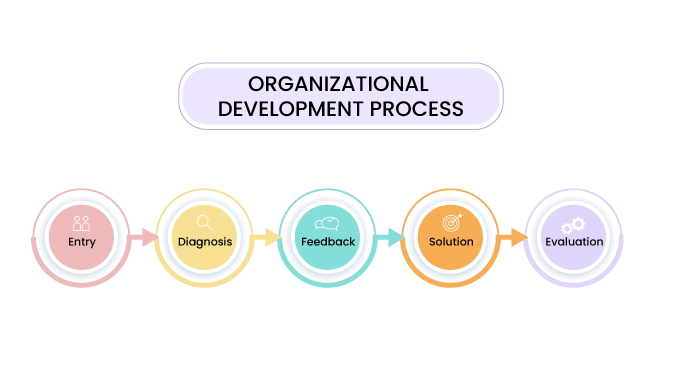Organizational Development (OD) plays a crucial role in driving and supporting organizational growth. By focusing on improving organizational effectiveness, enhancing employee performance, and fostering a positive work environment, OD helps organizations navigate change and achieve their growth objectives. This article explores the key roles OD plays in facilitating and sustaining growth.

Enhancing Organizational Effectiveness
One of the primary roles of OD in growth is enhancing organizational effectiveness. OD initiatives aim to optimize processes, improve systems, and align organizational structure with strategic goals. By identifying inefficiencies and implementing improvements, OD helps organizations operate more efficiently, adapt to changes, and achieve their growth targets.
Supporting Change Management
Growth often involves significant changes, such as expanding operations, entering new markets, or restructuring. OD supports change management by providing strategies and tools to manage transitions smoothly. This includes preparing employees for change, addressing resistance, and ensuring that changes are implemented effectively. Successful change management helps organizations adapt to growth challenges and seize new opportunities.
Developing Leadership and Talent
Effective leadership and talent development are critical for supporting growth. OD focuses on developing leaders who can drive the organization’s vision and inspire teams. Through leadership training, coaching, and succession planning, OD ensures that the organization has the right people in key positions to lead and support growth initiatives. Talent development programs also help in building a skilled and capable workforce ready to meet growth demands.
Fostering a Positive Culture
A positive organizational culture is essential for growth. OD works to create and maintain a culture that supports collaboration, innovation, and high performance. By promoting core values, recognizing achievements, and addressing cultural issues, OD helps build a work environment where employees are motivated and engaged. A strong culture supports growth by aligning employees’ efforts with organizational goals and fostering a sense of commitment.
Enhancing Employee Engagement
Employee engagement is crucial for achieving growth objectives. OD implements strategies to boost engagement, such as improving communication, providing development opportunities, and creating a supportive work environment. Engaged employees are more productive, innovative, and committed, which contributes to the organization’s overall growth and success.
Aligning Strategy and Operations
OD ensures that organizational strategies are effectively translated into operational practices. By aligning strategies with day-to-day operations, OD helps organizations execute their growth plans more effectively. This alignment involves setting clear goals, defining performance metrics, and ensuring that all levels of the organization are working towards the same objectives.
Improving Team Dynamics
Effective team dynamics are vital for organizational growth. OD focuses on improving team performance by enhancing communication, collaboration, and conflict resolution. Through team-building activities and workshops, OD helps teams work more cohesively, which leads to better problem-solving and innovation. Strong team dynamics support growth by driving collective efforts towards achieving organizational goals.
Facilitating Innovation and Adaptability
Growth often requires innovation and adaptability. OD fosters an environment that encourages creativity and embraces new ideas. By supporting continuous learning and providing resources for experimentation, OD helps organizations stay competitive and responsive to market changes. Encouraging innovation and adaptability ensures that the organization can capitalize on growth opportunities and navigate challenges effectively.
Measuring and Monitoring Performance
OD plays a role in measuring and monitoring performance to support growth. By establishing key performance indicators (KPIs) and conducting regular assessments, OD provides insights into organizational performance and identifies areas for improvement. Performance data helps in making informed decisions and adjusting strategies to ensure that growth objectives are met.
Building Resilience
Organizational growth can bring about challenges and uncertainties. OD helps build resilience by developing strategies to manage stress, address setbacks, and maintain a positive outlook. Resilient organizations are better equipped to handle growth-related pressures and sustain long-term success.
Conclusion
Organizational Development plays a pivotal role in supporting growth by enhancing organizational effectiveness, managing change, and developing leadership and talent. OD fosters a positive culture, improves employee engagement, and aligns strategies with operations. It also promotes innovation, monitors performance, and builds resilience. By focusing on these areas, OD helps organizations navigate growth challenges and achieve their long-term objectives.
Meta Description: Explore the role of Organizational Development in growth, including enhancing effectiveness, supporting change, developing leadership, and fostering a positive culture for sustained success.

